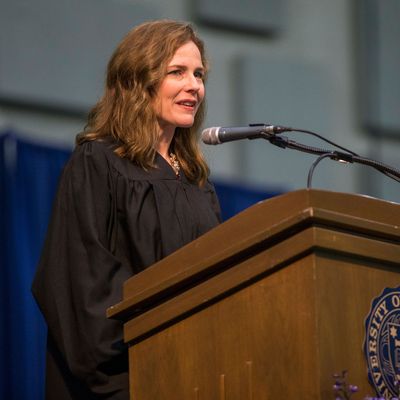
When the president announced Brett Kavanaugh as his nominee to replace Supreme Court justice Anthony Kennedy, there was an almost audible sigh of disappointment from hard-core social conservatives who had rallied to the banner of Seventh Circuit judge Amy Coney Barrett. National Review’s David French said it right out loud in an op-ed, suggesting that Trump’s audacity led some to believe he wouldn’t take the safe option of the very conventional Kavanaugh:
Would another Republican have the guts to put forward a nominee who would so clearly inflame the culture wars? Would another Republican president shatter the GOP nominee mold by selecting a mother of seven kids, an outspoken Christian and a graduate from a “normal” non-Ivy League law school? The base-motivating, electrifying pick was right there, in the palm of his hand.
Ah, but then he wimped out and picked, according to French, “the wrong judge,” saddening those who looked forward to a confirmation battle that would get people beating on each other with big sticks, and convince Christian conservatives to give their godless liberal foes no quarter in the future.
Now the focus is on Kavanaugh, who may ultimately represent an inflammatory addition to the Supreme Court, but will work hard to lull us all into soporific indifference right up to the moment he offers that fifth vote to overturn Roe v. Wade.
In the Washington Post’s long report on the backstory to the Kavanaugh pick, however, there is an indication that Barrett did indeed make a big impression on Trump:
When Barrett sat down with Trump, she was friendly but reserved and did not particularly connect with the president. Nonetheless, he later told associates he was impressed by her and her large family, including one child with special needs and two adopted from Haiti, and that he hoped to save her as a future pick for the high court once she has more experience on the federal bench.
Trump’s immediate ability to see Barrett and her family as a presidential photo opportunity is pretty typical, of course. But add in the fact that a key element of Trump’s political coalition views her as a living weapon with which to smite the hated opposition — an emotion always close to the heart of MAGA people — and she’s tempting indeed. As a bonus, Barrett is only 46 years old, which gives her an extended shelf life as a potential justice young enough to provide a long, happy career of right-wing jurisprudence.
The big question, of course, is whether Trump will get another SCOTUS opening to fill. If he’s reelected in 2020, the odds of a third (or fourth or fifth) appointment go way up. It’s unclear how long Ruth Bader Ginsburg (who will turn 90 in 2023) and Stephen Breyer (who turns 80 next month) can hold on. At those ages no one is safe from ill health or worse even if Trump is a one-term president. An even more likely prospect is that Clarence Thomas (who is 70, and reportedly tired of the Court) will take the opportunity to make sure his successor is appointed by a Republican president and retire well before 2020.
If Thomas does retire, Trump would be under dual pressures to identify a successor whose reputation for pugilistic conservatism matches his, and to maintain African-American representation on the Court (Thomas succeeded Thurgood Marshall, who joined the Court in 1967). If someone meeting both of these criteria isn’t found, at a minimum someone who isn’t a white male and who excites conservative activists might be suitable, and Barrett could fill the bill.
In the meantime, Barrett will be serving on the Seventh Circuit, and there’s always the chance she will find ways to burnish or damage her SCOTUS credentials or her current status as a conservative rock star. Her future may depend on the health of current SCOTUS justices, Trump’s tenure in the White House, and the GOP’s ability to hang onto the Senate. But as someone who was relatively obscure until Dianne Feinstein and Dick Durbin criticized her for elevating religion over law in her Seventh Circuit confirmation hearings just last year, her star has risen rapidly in the constellation of judicial conservatives.






























